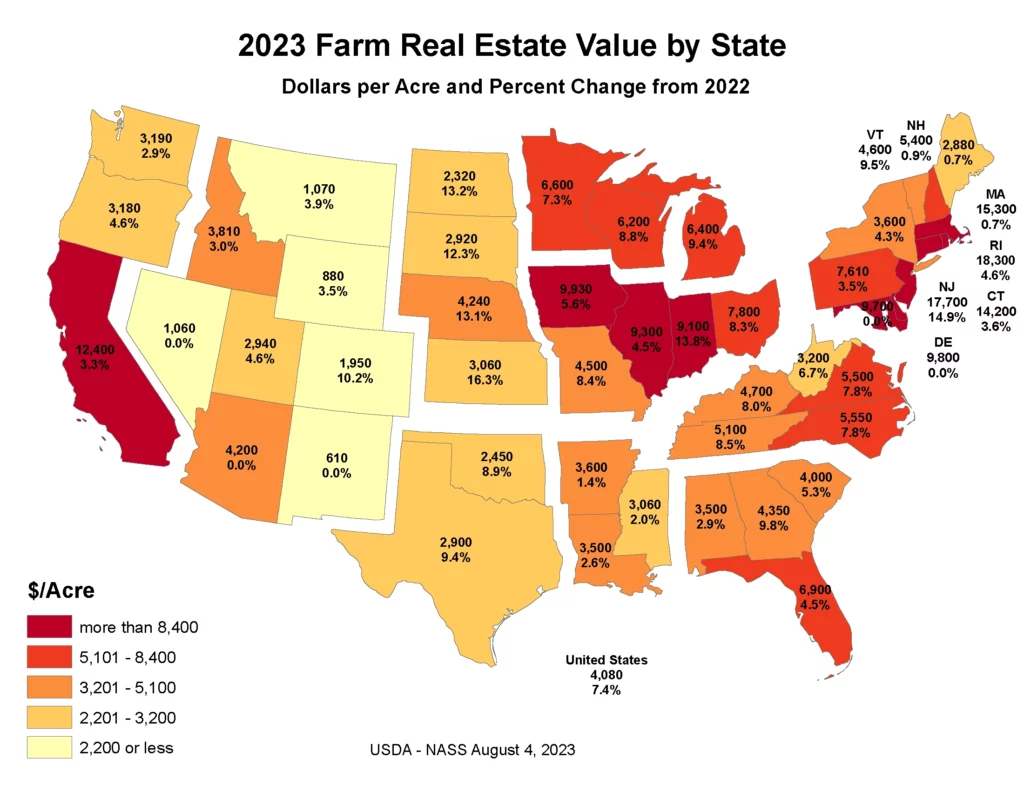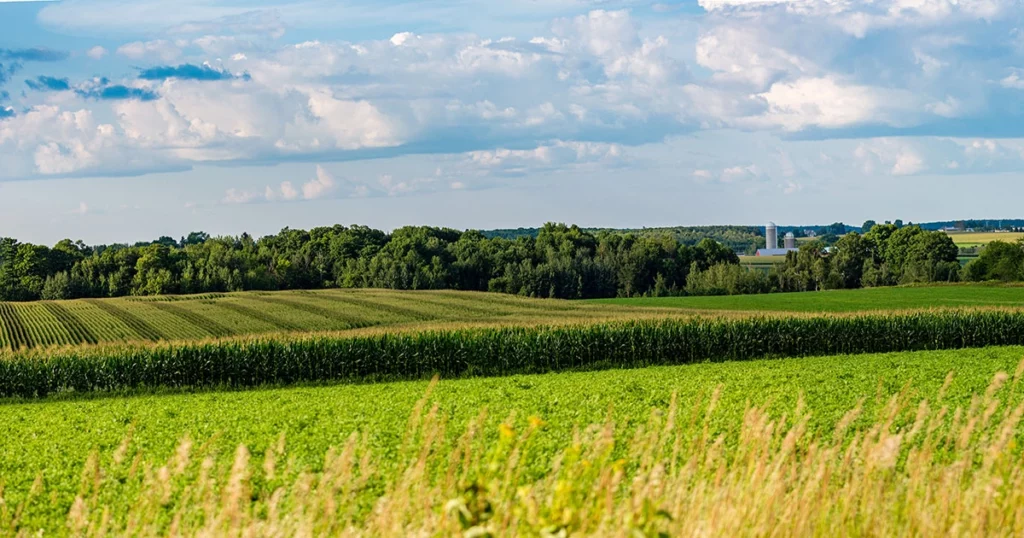2023 has seen a continuing increase in the value of land across the United States, according to the USDA National Agricultural Survey Service’s (NASS) annual Land Values Summary.
Conducted in June and released during August, the NASS delivered a survey summarizing the value of land per acre across several categories. In 2023, most U.S. states reported an increase in average land value per acre. Only five states (New Mexico, Nevada, Arizona, Maryland, and Delaware) experienced no change from 2022, and there weren’t any states that saw decreases in their land value. The U.S. saw a 7.4% increase in average land value to $4,080. Though this is a smaller increase than the 12% growth seen between 2021 and 2022, the 2023 national average signifies a trend towards rising land value in the 2020s thus far.

(via USDA NASS Land Values 2023 Summary)
Land Values by Economic Region
The 2023 Land Value Summary groups each of the surveyed states together by economic region. These regions include the Northeast, Lake States, Corn Belt, Northern Plains, Southeast, Delta States, Southern Plains, Mountain, and Pacific (which is visually represented in the map above). Here is a closer look at the land real estate value in each of the surveyed regions.
- The Northeast, which represents Connecticut, Delaware, Maine, Maryland, Massachusetts, New Hampshire, New Jersey, New York, Pennsylvania, Rhode Island, and Vermont, saw a 3.9% increase in average land value, with a reported value of $6,740. Within this region, the state with the highest land value is Rhode Island at $18,300. In contrast, the lowest land value reported is Maine, with an average of $2,880.
- The Lake States category represents Michigan, Minnesota, and Wisconsin. This region reported an average land value of $6,450, which is an increase of 8.2% from 2022. These states have similar average land values, though Minnesota reported the highest with $6,600. Wisconsin has the lowest land value in this region at $6,200.
- The Corn Belt denotes the states of Illinois, Indiana, Iowa, Missouri, and Ohio, which collectively reported an average land value of $8,100, a 7.1% rise from 2022’s survey. The highest reported average land value is Iowa’s at $9,930, while the lowest average land value in the region is Missouri with $4,500, which is over two times as little as that of Iowa’s.
- The Northern Plains region includes Kansas, Nebraska, North Dakota, and South Dakota. Together, the region reported a 13.7% growth, with an average land value of $3,160 per acre. Nebraska has the highest average value with $4,240, while the lowest is North Dakota with $2,320.
- The Appalachian states are Kentucky, North Carolina, Tennessee, Virginia, and West Virginia, which together saw a 7.8% growth from 2022. North Carolina has the region’s highest average land value at $5,550, while its lowest is West Virginia with $3,200.
- The Southeast is made up by Alabama, Florida, Georgia, and South Carolina. This region’s average land value for 2023 is $4,840, which is a 5.7% increase from 2022. Florida reported the highest average land value of $6,900, while the region’s lowest land value is Alabama’s at $3,500.
- The Delta States are Arkansas, Louisiana, and Mississippi, which together have an average land value of $3,400, which is a 1.8% increase from the year prior. Its highest value is Arkansas at $3,600, while the lowest value is Mississippi at $3,060.
- The Southern Plains is the smallest region, making up only Oklahoma and Texas. Together, they had an average land value of $2,800, which shows a growth of 9.4% since 2022.
- The Mountain states are made up of Arizona, Colorado, Idaho, Montana, Nevada, New Mexico, Utah, and Wyoming. This region reported an average land cost of $1,450, which is 4.3% more than in 2022. Its largest land value is that of Colorado with $4,200, while its smallest is New Mexico with $610.
- The Pacific region refers to California, Oregon, and Washington, which together have an average land value of $7,270, up 3.3% from 2022. California has the region’s highest average land value by a wide margin with $12,400. Contrastingly, Oregon has the region’s lowest land value with $3,180.

